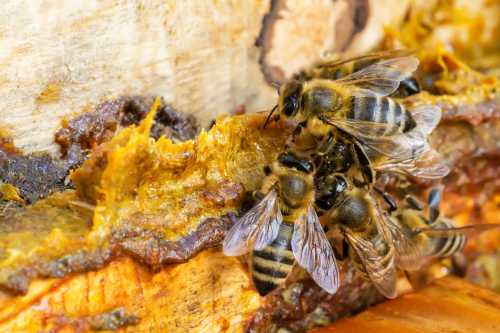Is Propolis Good For Sore Throat? - The Scientific Evidence
Propolis (and other hive products) has been used as a medicine by humans for many hundreds of years – possibly as long as 15,000 years.
These days, one of the most common available hive products on the market is propolis throat spray, but is there any robust scientific evidence to support the use of propolis for sore throat, or is it merely 'old wives' tale' or even pseudo-science?
What Is Bee Propolis?
Propolis is a well-known natural resinous mixture produced by honey bees from exudates from buds, plants, poplars, conifers, birch, pine, alder, willow, palm, Baccharis dracunculifolia, and Dalbergia ecastaphyllum1.
To learn more about how propolis is made and used by bees, and what it contains, see my page about bee propolis.

Propolis For Sore Throat? - The Scientific Evidence
Indeed, there have been a great many scientific studies carried out to find out whether propolis is a good treatment for illnesses of the human respiratory system, such as sore throat, and other infections.
Whilst some of those studies have been undertaken in animals rather than humans, and others have been in-vitro rather than in-vivo (in 'test tube' conditions rather than in the human body), there is good scientific evidence to suggest efficacy of propolis in humans for sore throat (pharyngitis) and related conditions.
What does propolis do for sore throat?
As we'll see from the studies below, propolis may reduce severity of infection, and may help prevent the development of associated infections of the respiratory tract.
The use of propolis as an 'add-on' therapy may help reduce the use of other medicines.
Di Pierro et al 20162
One study examined whether propolis would help prevent tracheitis, bronchitis, or rhinosinusitis developing from viral pharyngitis (sore throat) or acute otitis media (ear infection).
The study was undertaken in Italy in 56 children and included a control group. Di Pierro et al state that the use of propolis supplement for 72 hours lessened the severity of ear infection and viral sore throat.
It also reduced the use of antipyretics and anti-inflammatory drugs, and decreased the rate of evolution to tracheitis, bronchitis, and rhinosinusitis. The authors state propolis had very good acceptance among parents, and that propolis could be used as a safe add-on therapy in case of ear infection and/or viral pharyngitis (sore throat caused by virus).
They suggest that the use of propolis as an add-on therapy may reduce the use of other treatments such as antipyretics and anti-inflammatory drugs.
Efficacy of propolis against other respiratory tract conditions
Propolis has been found to be effective against other respiratory tract conditions, some of which may accompany a sore throat.
Crişan et al 19953
Crişan et al evaluated the action of propolis in preschool children and school children treated during the whole cold season 1994-1995. The results demonstrated a favorable effect of
propolis in lowering the number of symptomatic cases of common cold (rhinopharyngitis) - implying a preventative effect on spread of the virus - and decreasing, and sometimes suppressing,
the microbial flora of the upper airways.
Cohen et al 20044
Cohen et al conducted a randomized, double‐blind, and placebo‐controlled clinical trial in four hundred and thirty children, aged 1 to 5 years.
They demonstrated that a mixture of propolis, echinacea and vitamin C led to a 50% reduction in episodes of respiratory infections, including tonsilitis, and reduced the number of days with fever.
Can honey propolis throat spray help a cough?
It is worth remembering, that one of the studies (Cohen et al) used a mixture of propolis, echinacea and vitamin C. A discussion of the efficacy of the latter two ingredients is beyond the scope of this article.
However, honey is a proven anti-tussive (cough suppressant) - see Will Honey Stop A Cough?. Given the evidence above, the pairing of honey with propolis within a throat spray, would seem a natural one.
Bee Propolis Throat Sprays And Treatments
Please note, links to Amazon may be affiliate links. For further information, please see my Advertising And Affiliates Disclosure.
1. BEEKEEPER'S NATURALS Propolis Throat Spray
According to the description, this product is for "Throat Care, Immune Support, Cough Relief, Cold and Flu Control".
At the time of writing this page, this product has over 8,000 reviews on Amazon, most overwhelmingly positive.
2. Herb Pharm Soothing Throat Spray Herbal Formula with Echinacea and Propolis
If you were intrigued by the Cohen et al study, this Certified Organically Grown throat spray formulated with echinacea and propolis may be of interest, and has many positive reviews.
3. PRI Propolis Oral Spray with Manuka Honey, Sore Throat & Immune Support
Combine the benefits of Propolis with Manuka honey.
Manuka is highly regarded for its medicinal qualities, and as stated previously, honey is a known cough suppressant.
Read about Manuka Honey.
References
1. Bankova V, de Castro SL, Marcucci MC. Propolis: recent advances in chemistry and plant origin. Apidologie. 2000;31(1):3–15.
2. Di Pierro F, Zanvit A, Colombo M. Role of a proprietary propolis-based product on the wait-and-see approach in acute otitis media and in preventing evolution to tracheitis, bronchitis, or rhinosinusitis from nonstreptococcal pharyngitis. Int J Gen Med. 2016 Nov 11;9:409-414. doi: 10.2147/IJGM.S118967. PMID: 27956842; PMCID: PMC5113938.
3. Crişan I, Zaharia CN, Popovici F, et al. Natural propolis extract NIVCRISOL in the treatment of acute and chronic rhinopharyngitis in children. Rom J Virol. 1995;46(3–4):115–133
4. H.A. Cohen, I. Varsano, E. Kahan, E.M. Sarrell, Y. Uziel Effectiveness of an Herbal Preparation Containing Echinacea, Propolis, and Vitamin C in Preventing Respiratory Tract Infections in Children: A Randomized, Double-blind, Placebo-Controlled, Multicenter Study Arch. Pediatr. Adolesc. Med., 158 (2004), pp. 217-221, 10.1001/archpedi.158.3.217
If you found this page helpful or interesting, I'd really be grateful if you would share it with others - if not this page, perhaps another, such as Gardening For Bees.
Thank you so much :) .

